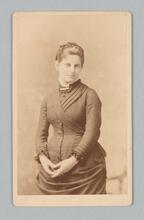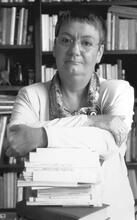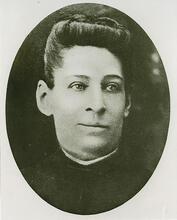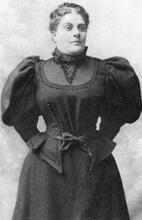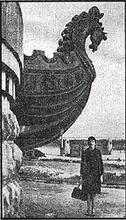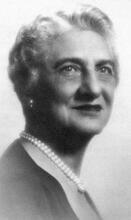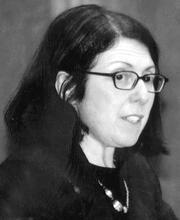Sophie Cahn Axman
Sophie Cahn Axman became known for her work as a probation officer helping troubled children. Axman began her social work as founder of the Free Kindergarten for poor Jewish children in Kansas City. After moving to New York, she worked for United Hebrew Charities She spoke at the first convention of the National Council of Jewish Women and the Winter School of Philanthropy in New York City and wrote pamphlets on working with children. In 1904, she found her calling as a probation officer for Jewish boys housed at the Manhattan House of Corrections, known as “the Tombs.”
Article
Sophie Cahn Axman was an articulate and opinionated Progressive reformer, a member of the Jewish elite with an uncompromising drive to improve her people.
She was born July 29, 1865, in Washington, D.C., to Joseph and Carrie (Friedenwald) Cahn. After graduating from Mrs. Fröhlich’s School in New York, she married Charles David Axman, then a clothing merchant. The Axmans lived in Kansas City, where Sophie founded the Free Kindergarten for poor Jewish children. After the Spanish-American War, Charles sold his business and went to work for a short time in Cuba. Shortly after the turn of the century, the couple moved back to New York City, where Charles soon joined the prestigious banking house Ladenburg, Thalmann, and Company, and Sophie Axman threw herself wholeheartedly into philanthropy and criminal reform.
Sophie Axman first worked as a “visitor” for United Hebrew Charities (UHC), presumably to ascertain poor Jewish households’ worthiness for aid from UHC and educate mothers in matters of household management and child rearing. In 1902, she became the editor of UHC’s magazine, Charity Work, and continued to write or edit it through its name change in 1903 to Jewish Charity until late 1904. She involved herself in charitable and religious work, speaking at the first convention of the National Council of Jewish Women, the Jewish Chautauqua Society in Atlantic City, and the Winter School of Philanthropy in New York City and on Blackwells Island (now Roosevelt Island). During this period she wrote for House Beautiful magazine and wrote pamphlets on work among children. In her written work, Axman displayed a profound identification with her coreligionists and the lordly concern for the poor of a confident, upper-class woman.
By 1904, Axman and her husband and son Laurence were living in the Educational Alliance’s East Side House. Under the alliance’s auspices and through her own energetic initiative, Axman had begun to work as a probation officer for Jewish boys. She also administered the East Side House residence, which was an object of contention among Educational Alliance workers. Some thought it should be a true settlement house, inviting neighborhood participation and performing extensive social work, while others regarded it as simply a residence for alliance staff. After a conflict that may have been related to Axman’s dedicated commitment to social work, she withdrew and the family moved to a private residence on New York’s Upper East Side. Axman continued her probation work, but moved from the children’s to the special sessions court, whose convicted and accused were housed at the Manhattan House of Corrections, otherwise known as “The Tombs.” From 1906 until her retirement in 1923, Axman labored there, earning the sobriquet “The Angel of the Tombs.”
Axman’s son Laurence became a prominent attorney, and her husband, Charles, continued his banking work until shortly before he died in 1937. Sophie Cahn Axman lived her last years at the Park Central Hotel in Manhattan, until her death in on March 2, 1945, at age seventy-nine.
Selected Works by Sophie Cahn Axman
Charity Work 2, no. 1 (December 1902), and 2, no. 6 (July–August 1903), edited by Sophie Axman.
Jewish Charity, edited with Lee K. Frankel and Joseph Jacobs (October 1903–July/September 1904).
“Jewish Charity.” Jewish Charity 1 (October 1903): 1–5.
“The Northeast End.” Jewish Charity 1 (October 1903): 16.
“Probation Work Among Boys.” Charity Work 2, no. 6.
AJYB 7 (1905–1906): 37, 47 (1945–1946): 518.
“Charles D. Axman, Retired Banker, 87.” NYTimes, December 7, 1937, 25:4.
Educational Alliance. Minutes. Board of Directors, Educational Alliance, NYC (1904–1906).
“Mrs. Charles Axman.” NYTimes, March 3, 1945, 13:5.

